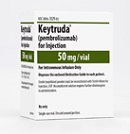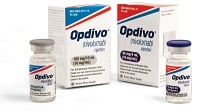 The rivalry is heating up between Merck & Co.'s ($MRK) immuno-oncology drug Keytruda and its counterpart from Bristol-Myers Squibb ($BMY), Opdivo, in lung cancer. Long expected to dominate, Opdivo has parlayed some impressive survival data into lickety-split expansion into new indications and an early lead in sales.
The rivalry is heating up between Merck & Co.'s ($MRK) immuno-oncology drug Keytruda and its counterpart from Bristol-Myers Squibb ($BMY), Opdivo, in lung cancer. Long expected to dominate, Opdivo has parlayed some impressive survival data into lickety-split expansion into new indications and an early lead in sales.
But now, Keytruda has some lung cancer survival data of its own. Merck unveiled full results of its Keynote-010 trial at an oncology meeting over the weekend, showing that, like Opdivo, it helped PD-L1-positive patients live longer compared with standard chemotherapy.
In fact, according to Bernstein analyst Tim Anderson, the data showed that Keytruda and Opdivo are pretty much on par in that group of patients; though the Opdivo studies included all patients, regardless of PD-L1 status, Merck's zeroed in on the biomarker-positive patients only.
In looking at Opdivo's results in that subgroup compared with Keytruda's, "the products look similar, unsurprisingly," Anderson says, noting that the anti-PD-1/PD-L1 drugs appear to be about the same. The data "show similar benefits over chemotherapy for both drugs, and safety profiles are comparable. Both companies' data also show that the higher the level of PD-L1 expression, the greater the clinical benefit."
This is big for Merck, because Opdivo's survival data has been a major talking point for the drug. It was why the FDA gave the BMS drug such a speedy initial approval in lung cancer; the agency's oncology chief, Dr. Richard Pazdur, said as much in interviews afterward. And it's why so many analysts had pegged the drug as the likely leader in the field, with $8.2 billion in 2020 sales, $3 billion more than Keytruda's $5 billion estimate, according to EvaluatePharma.
It's true that Merck's proven results are limited to PD-L1-positive patients, which gives Opdivo a bigger market overall. But Merck could turn the specificity of its data to a marketing advantage, Anderson figures. The company can argue that it's really PD-L1-positive patients who should be getting these immunotherapies in any case--in fact, the FDA made the point of saying that PD-L1 patients with non-squamous NSCLC were most likely to benefit from the BMS drug. And because Merck's studies are focused there, it could argue that Keytruda should be the first choice.
Keytruda also has the advantage of dosing once every three weeks, compared with every two weeks for Opdivo.
 Still, Opdivo is ahead in the indications race, with two new approvals gained last month. The FDA blessed the drug for use in kidney cancer--it was the first to show a survival benefit in that disease since 2007--and for first-line use in melanoma. Merck has since evened the score a bit, though; the FDA gave Keytruda a first-line melanoma nod on Friday.
Still, Opdivo is ahead in the indications race, with two new approvals gained last month. The FDA blessed the drug for use in kidney cancer--it was the first to show a survival benefit in that disease since 2007--and for first-line use in melanoma. Merck has since evened the score a bit, though; the FDA gave Keytruda a first-line melanoma nod on Friday.
But the head-to-head battle could soon get more complicated. The two meds could soon have another rival: Roche's ($RHHBY) atezolizumab, which targets PD-L1, rather than PD-1 as the other two do. Though the Swiss drugmaker's entrant carries a $2 billion sales estimate right now, Roche thinks that PD-L1 target, its data in a broad range of cancers, plus some combination-therapy studies, could give atezolizumab a better shot than analysts realize.
- read Merck's melanoma nod release
- and the lung cancer survival data statement
Special Reports: Top 15 pharma companies by 2014 revenue - Merck - Bristol-Myers Squibb | Top 10 best-selling cancer drugs of 2013